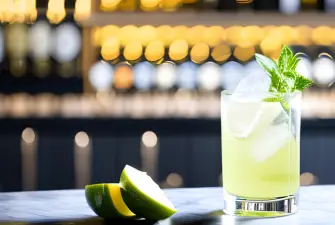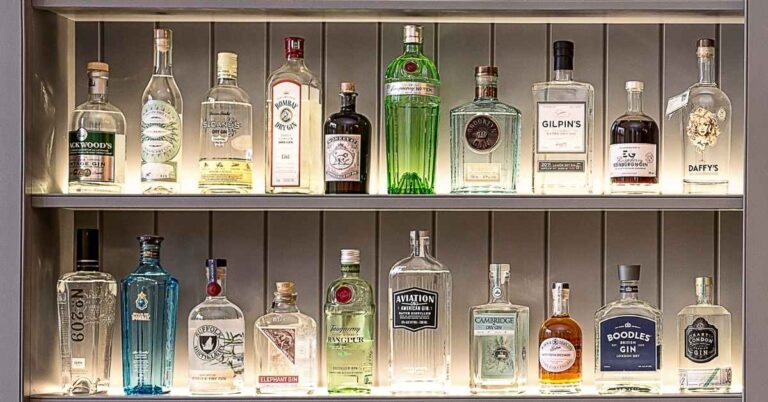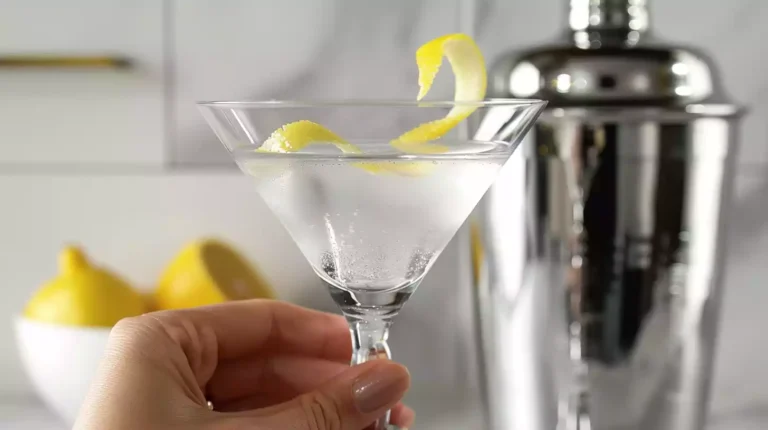The Gin Test: Can You Smell Gin On Your Breath?
When I smell gin on my breath, it’s the juniper berries and alcohol mix that stands out, sticking around to tell others what I’ve been sipping.
Different gins offer various strengths of this telltale scent, making it quite distinctive. Juniper’s botanical touch and the alcohol content play key roles in this aroma.
If you want to know more about why that gin lingers on your breath, there are fascinating insights waiting for you.
Main Points Covered Below
- Gin’s botanicals and alcohol content contribute to the distinct aroma on breath.
- Metabolism rate influences how long the gin smell lingers.
- Hydration levels can dilute compounds responsible for the odor.
- Different gin brands and styles result in varying intensities of breath odor.
- Remedies like mints or gum can temporarily mask the noticeable gin scent.
Understanding Gin Breath
Understanding Gin Breath starts with recognizing the distinct aroma that arises from the botanical ingredients in gin. Juniper berries, a pivotal botanical in gin, play an important role in creating the unique scent associated with gin breath.
The alcohol content in gin contributes to the noticeable smell on the breath, giving rise to what’s commonly known as gin breath. Different gin brands and styles can result in varying intensities of this distinct odor, making it a recognizable signature of a night spent enjoying gin cocktails.
While masking remedies like strong mints or chewing gum can temporarily cover up the smell of gin on your breath, it’s essential to note that the alcohol content will persist until metabolized by your body.
Understanding the science behind gin breath helps us appreciate how the combination of botanical ingredients and alcohol creates this unmistakable aroma that lingers even after the last sip of your favorite gin drink.
Causes of Gin Odor
When exploring the causes of gin odor, one can’t overlook the role played by the botanical ingredients such as juniper berries, coriander, and citrus peels in its production.
These ingredients give gin its unique aroma, which can linger on your breath long after you’ve enjoyed a drink. Here are some key factors to take into account:
- Alcohol Content: Gin typically contains around 40-50% alcohol by volume (ABV), contributing to the strong scent that can be detected on your breath.
- Botanical Ingredients: The specific botanicals used in gin production affect its aroma, with juniper berries being the most prominent and responsible for the recognizable gin smell.
- Metabolism: Your body’s metabolic rate can impact how quickly it processes the alcohol in gin, influencing how long the scent remains on your breath.
- Hydration Levels: Staying hydrated can help dilute the compounds responsible for the gin odor, potentially reducing its intensity on your breath.
These factors all play a role in why you might smell gin on your breath after indulging in this popular spirit.
Metabolic Process of Gin
When you drink gin, your body starts working to break it down. As the liver metabolizes gin, it processes the aromatic compounds from the botanicals.
Eventually, these components are released into your bloodstream, affecting your breath’s scent.
Gins Digestive Transformation
During digestion, gin undergoes a metabolic transformation as enzymes in the liver break down its components, eventually contributing to its distinctive aroma on the breath. This process involves the metabolism of alcohol in gin, where the alcohol is absorbed into the bloodstream and broken down by the liver.
The unique botanicals and flavors present in gin play a role in creating this specific aroma on the breath. Factors like metabolism rate and hydration levels can also influence the presence of gin’s smell on your breath.
- Enzymes in the liver break down gin components, leading to its aroma on the breath.
- Alcohol in gin is metabolized in the body through digestion.
- The botanicals in gin contribute to its recognizable scent post-consumption.
- Factors like metabolism rate and hydration levels affect the presence of gin on your breath.
Excretion of Gins Aroma
As the body metabolizes gin, the distinct aroma associated with its botanical components is excreted through the breath due to the breakdown of alcohol compounds in the liver. This means that the unique scent of gin that lingers on your breath isn’t directly from the drink itself but rather from the metabolic process it undergoes in your body.
The juniper berries and other botanicals in gin play a role in creating this identifiable aroma that others may detect. Factors like how much gin you consume, your metabolism rate, and hydration levels can influence how strong this scent is.
Impact on Social Interactions
Smelling gin on your breath can greatly influence how others perceive you in social settings. The noticeable aroma of gin on your breath might lead to various reactions from those around you.
Here’s how it can impact social interactions:
- First Impressions: The smell of gin on your breath can create an immediate impression, affecting how others view you upon first meeting.
- Professional Settings: In formal or work-related environments, having gin breath may be seen as unprofessional or inappropriate.
- Personal Relationships: Friends and acquaintances might notice the smell of gin on your breath, potentially leading to questions or concerns.
- Remedies and Solutions: Using mints, chewing gum, or other breath fresheners can help mask the odor temporarily, giving you more confidence in social situations.
In social interactions, the smell of gin on your breath can play a significant role in how you’re perceived, making it essential to explore remedies to mitigate its effects.
Health Implications of Gin Breath
The presence of juniper berries and botanical compounds in gin can result in a distinct and lingering aroma on one’s breath, impacting overall health. The alcohol content and botanical ingredients in gin contribute to this noticeable odor, which can be quite strong even in small amounts.
Excessive consumption of gin can lead to a more potent and long-lasting gin breath, affecting not just your breath but potentially your social interactions and self-esteem as well.
The compounds in gin that create this unique aroma can have health implications if consumed in large quantities. While enjoying gin in moderation is generally fine, excessive intake can lead to various health issues beyond just the noticeable breath odor.
Please be mindful of your alcohol consumption and its effects, including the distinct gin breath it can leave behind. So, next time you indulge in a gin cocktail, remember to do so responsibly to avoid the unwanted consequences on your health and breath.
Remedies for Gin Smell
To combat the lingering smell of gin on your breath, consider utilizing simple remedies that can help freshen your breath and mask the distinct aroma. Here are a few tips to help combat the smell of alcohol:
- Drink Water: Hydrating yourself not only dilutes the smell of gin but also helps invigorate your breath. Opt for plain water or add a splash of lemon for an extra invigorating twist.
- Chew on Fresh Herbs: Chewing on fresh parsley or mint leaves can help mask the odor of gin on your breath with their natural, revitalizing scents.
- Use Mouthwash: A high-quality, alcohol-free mouthwash can temporarily cover up the gin odor on your breath, leaving you with a minty-fresh scent.
- Snack Smart: Snacking on plain crackers or nuts can help absorb some of the gin smell, effectively rejuvenating your breath in the process.
Is There a Connection Between Different Types of Gin and How Strong the Scent Is?
When it comes to the various types of gin, there can be a significant difference in the strength of their scents. For example, London dry gin tends to have a strong juniper scent, while Old Tom gin may have a milder aroma. The type of gin can definitely impact the strength of its scent.
Effective Mouthwash for Gin Breath
Considering the necessity to combat the lingering aroma of gin on your breath, opting for an alcohol-free mouthwash proves to be an effective solution. Alcohol-free mouthwash contains antibacterial properties that target the compounds in gin contributing to bad breath.
By using this type of mouthwash, you can eradicate the odor without drying out your mouth like alcohol-based mouthwashes might. Regular use of alcohol-free mouthwash not only helps maintain fresh breath but also guarantees that the smell of gin on your breath doesn’t linger.
Selecting a mouthwash with antibacterial properties is crucial in combating bad breath caused by gin consumption. These properties help eliminate the bacteria responsible for the odor, leaving your breath fresh. After enjoying gin, make it a routine to use alcohol-free mouthwash to freshen your breath and reduce any lingering scent.
By incorporating this into your regimen, you can effectively tackle the issue of gin breath and enjoy long-lasting freshness.
Natural Ways to Freshen Breath
When seeking natural ways to freshen breath, incorporating simple habits into your daily routine can make a significant difference. Here are some effective tips to help maintain good oral hygiene and combat the smell of gin on your breath:
- Drinking Green Tea: Green tea isn’t only rich in antioxidants but also helps freshen your breath and keep your body hydrated.
- Chewing on Parsley or Mint Leaves: The natural oils in herbs like parsley and mint can effectively mask the smell of gin on your breath.
- Using Apple Cider Vinegar: Gargling with apple cider vinegar can assist in reducing the odor of gin on your breath by cleansing your mouth and throat.
- Avoiding Garlic and Onion: These foods can contribute to bad breath, so minimizing their intake can help keep your breath smelling fresh naturally.
Incorporating these natural remedies into your routine can help you combat Breath Smell effectively and maintain good oral health.
Timeframe for Gin Breath to Disappear
Gin breath doesn’t last forever; typically, it takes about one hour for the body to process each standard drink. Factors like metabolism, body composition, and food intake can influence how long the scent lingers.
To speed up the disappearance of gin breath, staying hydrated, maintaining good oral hygiene, and using strong gum or foods can help mask the smell.
Duration of Gin Breath
The duration of gin breath can vary greatly depending on individual factors such as metabolism, hydration levels, and food consumption.
- Metabolism Matters: Individual metabolism plays a significant role in how long gin breath lingers.
- Hydration Helps: Staying hydrated can aid in the dissipation of the alcoholic beverage’s scent on your breath.
- Food for Thought: The type and amount of food consumed alongside the gin can impact how noticeable the smell remains.
- Alcohol Content Counts: Higher alcohol content in the gin can prolong the duration of the aroma on your breath.
Ways to Mask Smell
To effectively mask the smell of gin on your breath and reduce its lingering presence, incorporating fresh herbs like parsley or mint can be a simple yet effective solution. Chewing on parsley or mint leaves can help mask alcohol breath, giving you a fresher scent.
In addition, drinking water to stay hydrated can dilute the gin scent on your breath, helping to rid of alcohol breath faster. Avoiding strong-smelling foods like garlic and onions can also help minimize the noticeable gin odor.
It’s important to maintain good oral hygiene by brushing your teeth and using mouthwash to further mask alcohol breath. While time is the most effective way for gin breath to naturally dissipate as the body metabolizes the alcohol, these tips can help minimize its effects in the meantime.
Long-Term Strategies for Fresh Breath
Implementing consistent oral hygiene practices, such as regular brushing and flossing, plays a key role in combating the lingering smell of gin on one’s breath. To guarantee fresh breath in the long run, consider the following tips:
- Stay Hydrated: Drinking water throughout the day helps in flushing out toxins and reducing the scent of gin lingering on your breath.
- Chew Sugar-Free Gum: Chewing on sugar-free gum or mints can temporarily mask the smell of gin on your breath, providing a quick fix when needed.
- Use Alcohol-Free Mouthwash: Opt for alcohol-free mouthwash to kill bacteria that contribute to bad breath from gin consumption.
- Try Natural Remedies: Consuming natural breath fresheners like parsley or mint leaves can help combat the noticeable scent of gin on your breath, providing a natural and invigorating solution.






